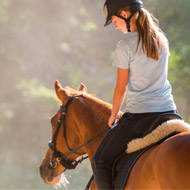Equine sector welcomes new ID legislation

The new legislation makes it a legal requirement for every horse, pony and donkey in England to be microchipped and have a valid UK passport.
The equine sector has welcomed new equine ID legislation that will give horses greater protection against theft, the spread of disease and neglect.
The new legislation, which came into force on Monday (1 October), makes it a legal requirement for every horse, pony and donkey in England to be microchipped and have a valid UK passport, with details stored on the Central Equine Database.
Owners of horses born before 30 June 2009 have two years to ensure their animals are microchipped, with horses born after this date already required to be chipped. Any changes in the ownership status of a horse must be notified to the Passport Issuing Organisation (PIO), which then has 24 hours to update the Central Equine Database (CED).
Besides protecting against theft and fraudulent sales, the new legislation will be key to the management of disease outbreaks, allowing for the mapping of horse populations and rapid communication with owners.
Welcoming the legislation, British Horse Council chair Jeanette Allen said: “Previous legislation has been half-baked but the new regulations are not only positive for horse owners but are a significant boost for equine health and welfare.
“Having all up-to-date data recorded on the Central Equine Database will help us better protect our equine population in the event of a disease outbreak, as well as providing essential tools to help owners find their horses in the event of theft or straying. It should also give owners confidence that horses which have previously been signed out of the human food chain never end up in the abattoir.”
BEVA chief executive David Montford said the new regulations will help ensure a wide range of equine medicines remain available to vets.
“Certain veterinary medicines can only be administered to a horse if it can be identified if treatment is recorded in the passport and/or if we can see that it is signed out of the human food chain,” he said. “If the passport is not readily available at the point of care then the treatment options are limited, errors in medicines records are possible and the authorities will seek to restrict medicines availability.
“Under the new ID regulations, vets will be able to positively identify the horse, check its status online and therefore use the most appropriate medicine with confidence. Vets want to do what is best for the horse and the new regulations will help ensure this is possible.”



 The Federation of Independent Veterinary Practices (FIVP) has announced a third season of its podcast, Practice Matters.
The Federation of Independent Veterinary Practices (FIVP) has announced a third season of its podcast, Practice Matters.